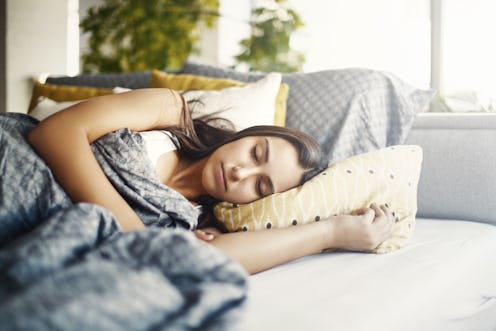Life
What Doctors Want You To Know Before You Treat Insomnia Yourself

Insomnia affects around 25% of American adults at some time in their lives, according to 2018 data from the University of Pennsylvania in 2018. And a lot of these people will likely turn to home remedies for insomnia first. From drinking warm milk before bed to eliminating electronic light from the bedroom, treating insomnia at home leaves you with a lot of options. However, doctors tell Bustle that in order for treating insomnia by yourself to be effective, you need to have a plan.
"There are many categories of insomnia, which all require different treatments," Dr. Michael Breus, Ph.D., a sleep specialist, tells Bustle. Insomnia can occur briefly or in chronic episodes, and can begin in response to stress, a health problem, or for no apparent reason. It can also affect different aspects of your sleep, including falling asleep or staying in deep sleep.
The first path to take if you want to treat insomnia at home, Dr. Breus says, is to educate yourself on what might be happening to your body. "Is it blue light? Is it anxiety? Is it pain? Is it a combination?" he says. Finding the source of your insomnia, if possible, will help you identify a plan of attack for treating it. Take notes about your sleep quality and any life events that might be affecting it, use a sleep tracker, and see if you can identify what may be triggering your insomnia episodes.
Taking this information straight to the doctor to get medication may be tempting, but it may not be the most helpful approach. Your first attempt at treatment shouldn't be medication, Dr. Breus says, particularly if you haven't tried any home remedies first. He tells Bustle that many doctors prescribe pills for insomnia because there aren't enough qualified healthcare professionals with training to deal with the condition, and medication can also represent a quick, but not long-term fix.
Sleep experts, however can help in your quest to understand and treat your insomnia at home. Dr. Breus recommends talking to a qualified psychologist or contacting your local sleep laboratory to ask for an insomnia expert with American Academy of Sleep Medicine accreditation. The proper therapy can also be helpful. Cognitive behavioral therapy (CBT) is recommended by the World Health Organization as a treatment for insomnia before the use of medication, and multiple studies have shown that it's effective. Experts suggest tracking down a CBT expert with experience in insomnia treatment therapies.
Other home techniques should also be explored. "There are many things that people suffering from insomnia can do at home," Dr. Richard Honaker, M.D., a primary care physician for online medical consultancy YourDoctors, tells Bustle. "Include exercise during your day and resist the urge to nap, and make sure that you set the scene for sleep with a cool room that does not include technology screens." Blue light and over-heated rooms have both been shown to increase wakefulness, so eliminating them may help induce bodily cues for sleep. He also suggests mindful breathing practices, which were proven to help people with insomnia fall asleep in a 2019 study published in JAMA Internal Medicine.
Experts also suggest avoiding alcohol as a sleep aid if you have insomnia. Dr. Honaker tells Bustle that reducing evening alcohol intake should be a key part of your attempts to beat insomnia, even if you think alcohol makes you sleepier. Alcohol is a depressant, meaning it slows down your body's functions in the way that feels conducive to sleep, but research shows it doesn't improve sleep quality.
If you and your doctor do decide that sleep aids are necessary to help cure your insomnia, Dr. Breus says it's important to talk to them about tapering your usage over time as the problem begins to ease. "I believe sleep medication should be used to break the cycle of insomnia, then tapered," he says. This will gradually reduce your reliance on the drug and help you have a good night's sleep without it.
Taking on insomnia at home may seem like a difficult task. However, with the right resources and help, experts tell Bustle it can be banished from your bedroom forever.
Studies cited:
Black DS, O’Reilly GA, Olmstead R, Breen EC, Irwin MR. (2015) Mindfulness Meditation and Improvement in Sleep Quality and Daytime Impairment Among Older Adults With Sleep Disturbances: A Randomized Clinical Trial. JAMA Intern Med. 175(4):494–501. doi:10.1001/jamainternmed.2014.8081
Mitchell, M.D., Gehrman, P., Perlis, M. et al. (2012) Comparative effectiveness of cognitive behavioral therapy for insomnia: a systematic review. BMC Fam Pract 13,40 doi:10.1186/1471-2296-13-40
Trauer JM, Qian MY, Doyle JS, et al. (2015) Cognitive Behavioral Therapy for Chronic Insomnia: A Systematic Review and Meta-analysis. Ann Intern Med. 63:191–204. doi: 10.7326/M14-2841
Experts:
Dr. Michael Breus, Ph.D., sleep specialist
Dr. Richard Honaker, M.D. primary care physician, YourDoctors Online
This article was originally published on